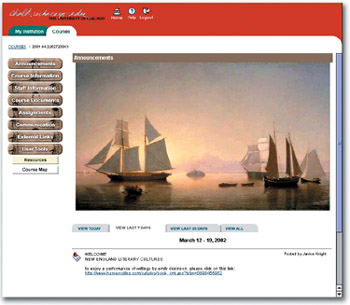 Chalk
it up to new technology
Chalk
it up to new technology
>>
The Internet has transformed almost every aspect of daily life-including
taking a Chicago course.
Students
in Candace Vogler's philosophy classes don't realize it, but
she's tricking them. Traditional discussion groups don't seem
to inspire them, and even the brightest undergraduates in her
upper-level ethics and political-thought courses are often too
"alarmed" by the presence of graduate students to
dive into classroom discussions. Vogler needed a way to get
students talking. "This is philosophy," points out
the associate professor, "which doesn't happen without
a conversation."

Her
trick? "Write a midterm that's too difficult for one person
to do alone, but if at least three of them do it together, they
will do well," Vogler told faculty at a recent day-long
seminar on Chalk, the University's online course-manage- ment
and course-content delivery system. "I tell them I don't
care how many people do it"-but the larger the group, she
assures the students, the better their chances of acing the
exam.
Once
the groups form, she sets up electronic discussion boards on
the course's Web-based Chalk site, allowing students to post
comments and questions at any time. The system lets her monitor
the students' progress and jump in if they get bogged down.
The results, she says, are "amazing"-both in the quality
of midterms submitted and in changed classroom dynamics. After
the online-discussion experience, undergraduates are "much
more likely to break in with a question, more likely to build
on questions, and even to suggest responses to questions. They
have a stake in the class."
Since
the online environment seems less intimidating than a face-to-face
classroom, undergraduates are also more likely to collaborate
with graduate students. One group of 17 students-who sent Vogler
a box of chocolates this Valentine's Day-has continued meeting
and discussing almost a full year after the course. "They
told me they never would have learned to talk to each other
without me-but all I did was use a teaching tool."
Vogler
is among the 45 percent of Chicago's 1,600 professors-717, to
be precise-who use Chalk, which runs on a platform created by
Blackboard, one of the nation's top commercial providers of
course-management systems. (The company's roots are in higher
education, with seven Cornell University undergraduates who
helped professors build course Web sites.) Since Chicago set
up Chalk two years ago, 680 courses have established sites-587
in this academic year alone-with College courses representing
about 60 percent. And this year 6,365 students are enrolled
in courses with Chalk sites-about half of them undergraduates.
The
system uses the same interface for all course sites. There is
a page for course information, such as syllabi and classroom
policies, and a page for course documents, including lists of
reserve materials. The library now digitizes most reserves that
would otherwise be offered as photocopies. The Regenstein reports
that 41 percent of all reserves are photocopies, and 79 percent
of those are available online as PDFs-making the days when 30
students competing for two photocopy packets while class time
quickly approaches a thing of the past.
Chalk
sites also have a page for external links, often to online archives,
and the communication areas include bulletin boards and a "virtual
classroom" for live online discussions or remote office
hours. If the faculty choose, students can turn in assignments
digitally rather than on paper. And professors can use the site
for grading and providing ongoing feedback-which students can
(and do) check as the quarter progresses.
For
Janice Knight's New England Literary Cultures offering and her
course on Chicago, the associate professor of English uses Chalk's
external-links page to connect students to "rich"
resources. For example, Knight has linked the site to audio
and video files of poets (or, as in the case of Emily Dickinson,
actors) reading their works. Knight's students can also view
facsimile reproductions of original manuscripts and early editions
of texts and explore Web sites that provide social, historical,
and political contexts for the course texts.
Access
to far-flung materials is a great benefit, but Knight says the
Web is an opportunity to get students thinking about how a work
changes as it's reproduced. She challenges them to consider
the politics of literary archives-and the common perception
that what's online is politically neutral and represents the
whole story. For her course on Chicago, Knight has students
keep online journals responding to assigned readings, and they
must read each other's entries before class. "So we come
several layers deeper into the conversation than we otherwise
would," she says.
Knight
also teaches a Ph.D. seminar titled Pedagogy and the Internet,
where the next generation of college teachers must create their
own online courses and prepare themselves for how the Internet
might transform a teacher's interaction with texts and students.
"They're
thinking about how the Internet challenges the traditional taxonomies
of our disciplines," she says, "and about how a layered
reading [of online text with audio and visual links] is different
from reading texts using the traditional footnote." She
challenges them to ask, "Is the Internet just a fancy Xerox
machine, letting us 'gussy up' the old materials? Or a fancy
encyclopedia, letting us add more background information?"
Or does the Web do what Knight believes it does: "raise
fundamental intellectual questions about our disciplines?"
Her graduate students, no doubt, have already given this plenty
of thought online.
-
S.A.S.

![]()
 Chalk
it up to new technology
Chalk
it up to new technology